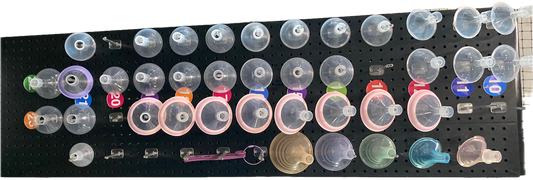
Why do women fail at breastfeeding?
Share
"I gave birth on Friday. There was no lactation help over the weekend. A pediatrician would only discharge us if we fed the baby 4 oz. of formula. I was anxious and I didn't know what to do, and ultimately, I failed at breastfeeding my baby."
It’s not fair to say women fail at breastfeeding.
Breastfeeding is often intuitive and straightforward and many women begin breastfeeding easily and effortlessly. Yet a high percentage of women end breastfeeding without ever really knowing why it didn’t work out.
It’s more accurate to say women are sabotaged and never had a chance to succeed.
I’ve been helping mothers breastfeed for over 20 years and sometimes it's heart-wrenching work. Families don't receive breastfeeding education during pregnancy, or any time during health classes or sex education classes. Somehow breastfeeding is considered so wonderful, so instinctive, and so natural, that we are expected to just intuitively know everything about it.
After a baby is born, most hospital programs don't provide enough teaching and coaching. They don't ensure that breastfeeding is going well before the family leaves the hospital. Most pediatricians are pro-breastfeeding but are quick to provide non-breastfeeding interventions if your baby isn't gaining weight fast enough.
So many women are not meeting their breastfeeding goals.
Even though about 80% of women in the United States leave the hospital breastfeeding and would like to exclusively breastfeed for about 6-12 months, there is a huge drop off between 2 weeks and 2 months resulting in about 84% of babies receiving some, or all, formula feed by 6 months of age.
By comparison, the United States Healthy People 2020 has set targets for babies to be exclusively breastfeeding. The targets for the year 2020 are: 82% of babies “ever breastfed”, 75% at 6 months, and 34% at 1 year. We are far from meeting this target!
Not breastfeeding is a cultural and structural problem.
Fortunately, all kinds of people in the US are working to increase breastfeeding rates. We are making progress and the change is happening through three channels:
1. Protection - This includes laws that protect breastfeeding in public, pumping breaks at work, maternity leave along with education and policy statements for health care practitioners to follow. This includes laws requiring health insurance companies to include lactation counseling and breast pumps with maternity benefits.
2. Promotion - This includes women nursing in public, scientists publishing research, government agencies creating public service ads, doctors encouraging women to breastfeed, World Breastfeeding Month activities, and displaying images of breastfeeding babies everywhere, but especially in healthcare settings.
3. Support - This includes breastfeeding support groups, doctors referring women to lactation resources, training more lactation counselors and consultants, and providing breastfeeding information and supplies through government programs like Center for Disease Control, National Institute for Health, Food and Drug Administration, WIC and Medicaid.
What's keeping moms from doing what's best for their babies?
In 2011, the Surgeon General’s Call to Action to Support Breastfeeding identified seven barriers to breastfeeding and I’ve identified three more.
During the past two decades, there has been a huge shift in promoting breastfeeding. Everyone knows that breastfeeding is good for moms and babies. But without a corresponding increase in protection and support, women get overwhelmed when they start breastfeeding.
They stop breastfeeding because it's just too hard to overcome breastfeeding barriers by themselves. It's just too hard to continue when the public, your health care team, your health insurance and your workplace are working against you, not for you.
We know that supporting women through trained breastfeeding counselors, support groups, accurate information and family education works. It's time for our government to put programs and laws into place to ensure that our most vulnerable, and most valuable asset, the youngest citizens of the USA, are breastfed!







